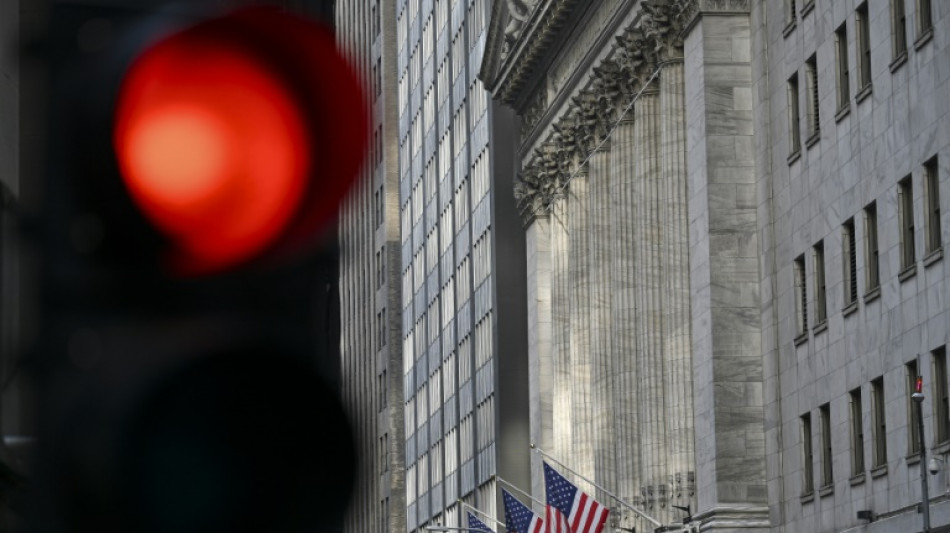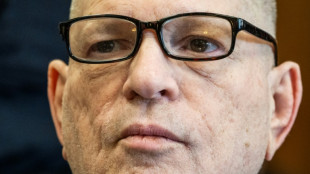
Wall Street rally fizzles as tariff worries resurface

Wall Street shares fell Thursday as a rally faded over lingering concerns about the economic fallout from President Donald Trump's trade war despite his U-turn on steep new tariffs.
A larger-than-expected drop in US consumer inflation in March added to the pessimistic outlook, as it suggested that uncertainty over Trump's tariff plans has already taken a toll on the world's largest economy.
Investors in response sold off the dollar, which had already taken a hit from the trade war worries, even though slowing inflation would give the Federal Reserve more room to cut interest rates to spur growth.
"Is inflation moving sustainably lower or did businesses and consumers pull in the reins as they brace for an economic slowdown?" said Bret Kenwell, US investment analyst at the eToro trading platform.
"Getting lower inflation due to a material drop in economic activity -- and thereby jeopardising the economy -- isn't the best route to take," he added.
Wall Street indices on Wednesday had posted their biggest one-day gains since 2008 after Trump announced the tariff pause, which had sent stocks lower around the globe in recent sessions.
Asian and European markets staged their own rallies on Thursday.
The shock decision to delay bigger levies on goods from scores of countries by 90 days drove the European Union to put its counter-tariffs on hold.
The trade war fears had also pummelled US Treasuries -- normally considered the safest option in times of crisis -- a sign of how nervous investors had become.
"The bottom line is that the tariff narrative still remains too volatile for comfort, and markets are searching for equilibrium in a sea of uncertainty," said Fawad Razaqzada, a market analyst at StoneX.
Trump nonetheless kept a baseline 10 percent tariff intact and ramped up his trade war with Beijing by hiking duties Chinese goods to 125 percent after facing strong retaliation.
But Chinese markets still benefitted from the relief rally across Asia and Europe on Thursday, also gaining support from optimism that Beijing will unveil fresh stimulus measures to support its economy.
Hong Kong rose more than two percent -- a third day of gains after collapsing more than 13 percent on Monday, its worst trading day since the Asian financial crisis in 1997.
"Crucially, we are currently still on course for a disorderly economic decoupling between the world's two largest economies, with no immediate signs of either US or China backing down," said Jim Reid, an analyst at Deutsche Bank.
US Treasury yields have edged down after a successful auction of $38 billion in notes.
That eased pressure on the bond market, which had fanned worries that investors were losing confidence in the United States.
Tech firms were the standout performers, with Sony, Sharp, Panasonic and SoftBank chalking up double-digit gains, while airlines, car makers and casinos also enjoyed strong buying.
Gold climbed two percent to $3,140 an ounce -- closing in on its record touched last month -- thanks to the weaker dollar and the metal's safe-haven status.
Oil prices dropped after bouncing more than four percent Wednesday, again under pressure from concerns about the global economy and its impact on demand.
- Key figures around 1350 GMT -
New York - Dow: DOWN 1.8 percent at 39,878.20
New York - S&P 500: DOWN 2.1 percent at 5,339.21
New York - Nasdaq: DOWN 2.8 percent at 16,641.78
London - FTSE 100: UP 3.9 percent at 7,979.04 points
Paris - CAC 40: UP 4.9 percent at 7,200.24
Frankfurt - DAX: UP 5.3 percent at 20,704.23
Tokyo - Nikkei 225: UP 9.1 percent at 34,609.00 (close)
Hong Kong - Hang Seng Index: UP 2.1 percent at 20,681.78 (close)
Shanghai - Composite: UP 1.2 percent at 3,223.64 (close)
Euro/dollar: UP at $1.1130 from $1.0948
Dollar/yen: DOWN at 144.80 yen from 147.82 yen on Wednesday
Pound/dollar: UP at $1.2928 from $1.2810
Euro/pound: UP at 86.12 pence from 85.45 pence
West Texas Intermediate: DOWN 4.5 percent at $59.51 per barrel
Brent North Sea Crude: DOWN 4.2 percent at $62.73 per barrel
K.Grimaud--PS

 London
London

 Manchester
Manchester
 Glasgow
Glasgow
 Dublin
Dublin
 Belfast
Belfast
 Washington
Washington
 Denver
Denver
 Atlanta
Atlanta
 Dallas
Dallas
 Houston Texas
Houston Texas
 New Orleans
New Orleans
 El Paso
El Paso
 Phoenix
Phoenix
 Los Angeles
Los Angeles



